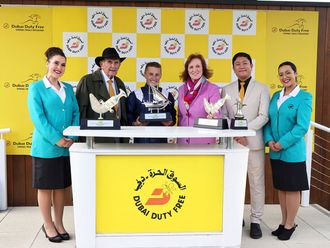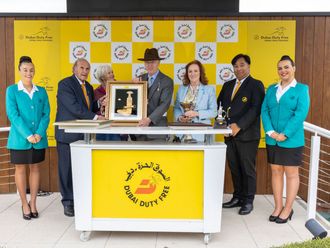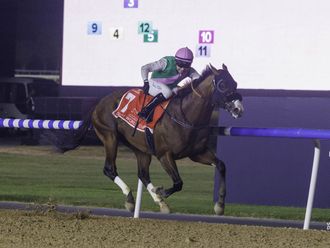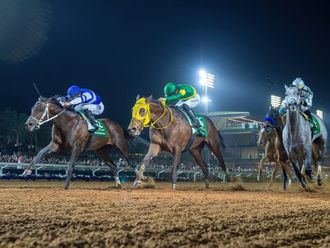I read with great interest, and a bit of unavoidable trepidation as well, that the proposed Pegasus World Cup, will become a reality in January next year.
Wow, the thought of 12 of the best, middle-distance dirt horses in the world racing for an unparalleled treasure of $12 million (Dh44 million) is enough to set the pulses racing.
And if that’s not all, the connections of these supreme beasts will be guaranteed an equal share in 100 per cent of the net income that the 1,800-metre contest will generate. That includes betting, media rights and sponsorships.
Sounds good enough to me, even though I do not even own a toy horse or, quite frankly, do not have the financial muscle to invest in a colt, or filly, by any one of the leading stallions like Dubawi, Tapit or Lucky Pulpit.
But it sets me thinking, nonetheless. And then, when you get to the small print, so to speak, you discover that the race, which is the brainchild of a gentleman called Frank Stronach, founder and honorary chairman of the Stronach Group, which owns Gulfstream Park in America, comes with unique clauses.
Okay, for starters, each of the connections hoping to run for the extra-large bouquet of roses that the race will offer (no offence to the Kentucky Derby), will have to shell out $1 million each to buy a spot in the Pegasus World Cup starting gate.
It’s as simple as that, sign a cheque for that amount, and you’re in. It’s a small fee to some annoyingly rich people, because at that exalted level in the world of racing, a million can actually be loose change.
But what happens once you’re in?
What if there are not enough annoyingly rich people who are willing to fork out $1 million to buy a ticket to the blockbuster race. What if there were only six of them or eight… will the purse still remain at its proposed amount of $12 million, and will the elite six race for just half that purse.
To put it in context, it’s like buying a seat at a poker table where the aim is to win and multiply the chips you invest.
As a horse race, the Pegasus World Cup, is at its core, different than most.
Refreshingly different? I’m still not sure. It’s a business venture. I’m sure the jury has already begun its deliberations.
The Pegasus World Cup is an intriguing business model for a sport that, like most others, is constantly in need of innovation.
But like any saleable product, the key to its success is in coming up with the right pricing structure. By charging too much it can put people off, or if it’s too low it will not serve its purpose.
So how do you find the right balance?
I think Stronach’s business model can change the face of horse racing forever, or ruin it eternally.
Consider some of the conditions that the race embraces. Entrants can race, lease, contract or share a starter, or sell their starting spot in the race. That certainly throws open the door for a multitude of options. Complex options, because it appears that you will have to buy your $1 million slot in the Pegasus starting gate months in advance and then hope that your horse stays, fit and competitive.
Call me old-fashioned, a square, behind the times, but I wouldn’t risk my little toy horse given such high risks.
But what I do like about the concept, is that it is self-funding, and that can’t be a bad thing, can it?












